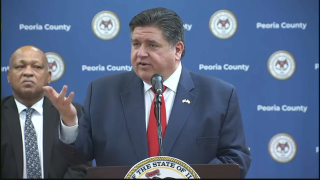
Illinois Gov. J.B. Pritzker said legislation recently proposed that could be crucial for the Bears' financing of an Arlington Heights property and a move from Soldier Field has "a lot of hoops to run through."
Speaking at an unrelated press conference Tuesday, Pritzker was asked about new legislation proposed in the Illinois General Assembly that could allow for property tax freezes on major development projects, like the one being proposed by the team as a replacement for the Arlington Park race track.
The proposal has been talked about quite a bit in recent weeks as the team continues to navigate the hurdles associated with a potential move out of Chicago and into the suburbs, but it has been met with some skepticism, including from those who proposed the measure.
"There was a note of skepticism even in the words of the person who introduced the bill," Pritzker said. "But I think she wanted to make sure that the General Assembly had an opportunity to hear about it and consider it in committee so I look forward to hearing more about it and seeing how it might evolve."
Pritzker noted that the Bears organization is "a private business" and said he doesn't believe "the public has an obligation to fund, in this major way, a private business."
"Obviously, there are things that we do for private businesses all the time that are important to them, including, you know, paving roads that are very important for building industry in the state, but I, you know, I am of the opinion that it's not our obligation as the state to step in and, you know, provide major funding," he said. "And I think I certainly don't want to burden taxpayers with, you know, major support for private business. So having said that, we'll see how this project moves along in the General Assembly."
Two bills were filed in Springfield this week surrounding possible measures that could impact the Bears' plans. They were filed by Arlington Heights Democrat Sen. Ann Gillespie.
Chicago Politics
One of the measures proposed would amend property tax code so some properties could be "certified by the Department of Revenue as containing a mega project." Those projects would then be eligible for an assessment freeze and "may be granted an abatement."
Last month, NBC Sports Chicago reported a measure to create a new type of tax subsidy known as payment in lieu of taxes, or PILT, was being drafted in the state.
Feeling out of the loop? We'll catch you up on the Chicago news you need to know. Sign up for the weekly Chicago Catch-Up newsletter.
A PILT is payment to a local government to offset property tax losses, the US Department of the Interior states. PILTs are different from tax-increment financing, or TIFs, since the tax amount can be negotiated, rather than being appraised.
Also in January, outgoing Bears president/CEO Ted Phillips cited property tax certainty as one of the hurdles that needs to be overcome before the Bears close on the Arlington Park property. Phillips said the Bears need to lock down infrastructure spending, as well.
Gillespie reportedly said she has "expressed my doubts" about the approach, but noted that she sponsored the proposal to encourage a broader conversation, the Chicago Tribune reported.
“If we’re going to do it, we need to do it in a way that protects residential taxpayers and small-business taxpayers from paying a disproportionate share of the load,” she said.
According to Crain’s Chicago Business, several large bodies in Illinois are “generally supportive” of the bill, including the Illinois Chamber of Commerce and the Illinois Road & Transportation Builders Association. The report says there are some who question whether the Bears need public assistance at all to fund the project. In a town hall with local residents last September, the Bears stated they would pay for a stadium in Arlington Park themselves, but would need public money to develop the rest of the property.
Several states have PILT programs, and it has been used for NFL stadium development projects before, like at MetLife Stadium.
The future of the legislation remains unclear, as both bills have yet to be assigned.



